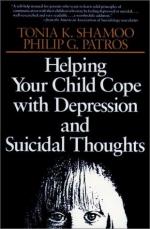|
This section contains 1,090 words (approx. 4 pages at 300 words per page) |

|
While actual reasons for suicide stem from complicated and often indeterminate causes, the public is left to sort out the implications of what Primo Levi calls this "noninstinctive, unnatural choice." In the early part of the twentieth century, suicide was a taboo subject. Popular opinion held that madness was the most plausible explanation for a person taking his or her own life. When suicides were mentioned in the 1910s and 1920s, they were characterized in terms of trends: Literary Digest once reported of "rashes" of childhood suicides, and again of college campus suicides. Suicide was seen as virtually a contagious disease.
The stock market crash of 1929 brought the first widespread acknowledgement of suicide in the twentieth century, with instantly legendary images of despondent former millionaires leaping to their deaths. As some news accounts of the time would have it, a person walking through New York City would have...
|
This section contains 1,090 words (approx. 4 pages at 300 words per page) |

|


